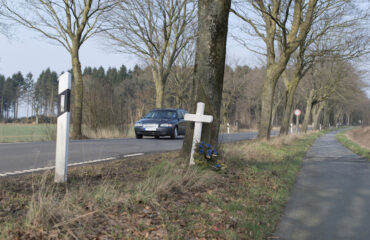Every day, thousands of people are affected by traffic crashes. Yet, they are often called “accidents,” implying that they are unpredictable and unpreventable. However, with 94% of traffic crashes caused by human error [1], most are neither random nor unavoidable. The phrase crash, not accident more accurately reflects the reality that these events are largely preventable. Changing how we talk about crashes can influence how we respond to them, encouraging accountability and action rather than passive acceptance.

Why Language Matters
Words shape perception. The Merriam-Webster dictionary defines an accident as “an unforeseen and unplanned event or circumstance.” [2] But many crashes are caused by impaired driving, distracted driving, speeding, or drowsy driving—all foreseeable and preventable actions. A fatal crash caused by texting while driving isn’t an accident; it’s a consequence of choice.
Studies also show how language influences perception. In an experiment by researchers Elizabeth Loftus and John Palmer, participants who watched a video of a crash were asked how fast the cars were going when they “smashed” into each other. Those who heard the word “smashed” gave higher speed estimates than those who heard “hit” or “collided.” [3] This study demonstrates how language can shape how we interpret events, including traffic crashes.
The History Behind the Word “Accident”
The use of “accident” to describe crashes has historical roots. A New York Times article [4] explains how the word was adopted in the early 1900s by industries seeking to avoid responsibility for workplace injuries. Auto manufacturers later used it to shift blame from cars to reckless drivers. Over time, “accident” has come to exonerate not only manufacturers but also individuals, making crashes seem like random misfortunes rather than preventable incidents.
Crash, Not Accident: Responsibility Matters
Consider a crash involving an impaired driver who runs a red light and kills another motorist. If we call it an “accident,” it implies no one is to blame. But in reality, the impaired driver made a choice that led to a fatal outcome. Holding individuals accountable—whether for impaired driving, texting while driving, or speeding—is crucial.

This shift in language is not just theoretical. Many states and organizations are actively promoting the use of crash, not accident to change public perception and encourage responsibility. The Associated Press (AP) has updated its AP Stylebook [6] to reflect this, advising journalists to avoid using “accident” when negligence is involved.
Building a Culture of Prevention
Awareness campaigns like “Drop the A Word” are gaining traction, urging media outlets and lawmakers to stop using “accident” when referring to crashes. [7] Some states have even revised their legislative language, recognizing that calling a preventable crash an “accident” can hinder efforts to improve road safety.
This change can have real-world effects. A fender bender caused by tailgating is preventable by maintaining a safe following distance. A pedestrian hit by a driver who failed to yield at a crosswalk isn’t a victim of an “accident” but of a preventable traffic violation. When we frame these incidents correctly, we reinforce the idea that safe driving behaviors matter.
A Safer Future Starts with Words
Changing the way we discuss crashes won’t solve every problem on the road, but it’s a necessary step in creating a culture of prevention. Recognizing crashes as preventable events instead of unavoidable accidents encourages both individual and systemic responsibility.
Using crash, not accident reminds us that we all have a role to play in making our roads safer. Whether as drivers, passengers, or pedestrians, we must recognize that our choices matter. By being mindful of our words, we can promote accountability and help prevent future crashes.
Footnotes:
[1] Critical Reasons for Crashes Investigated in the National Motor Vehicle Crash Causation Survey, Traffic Safety Facts, February 2015, National Highway Traffic Safety Administration, DOT HS 812 115. Obtained from: https://crashstats.nhtsa.dot.gov/Api/Public/ViewPublication/812115 NOTE: This publication does not attempt to assign blame on the driver for causing the crash, it is looking at any errors by the driver.
[2] Obtained from: https://www.merriam-webster.com/dictionary/accident
[3] Reconstruction of automobile destruction: An example of the interaction between language and memory, Eliabeth Loftus and John Palmer, Journal of Verbal Learning and Verbal Behavior, Volume 13, Issue 5. Obtained at: http://www.sciencedirect.com/science/article/pii/S0022537174800113#!
[4] It’s No Accident: Advocates Want to Speak of Car ‘Crashes’ Instead, Matt Richtel, May 22, 2016, New York Times. Obtained at: https://www.nytimes.com/2016/05/23/science/its-no-accident-advocates-want-to-speak-of-car-crashes-instead.html?mcubz=0&_r=0
[5] Motor vehicle Crash versus Accident: A change in terminology is necessary, Alan Stewart and Janice Lord, August 202, Journal of Traumatic Stress. Obtained from: http://onlinelibrary.wiley.com/doi/10.1023/A:1016260130224/full
[6] Ready to lowercase ‘internet’ and ‘web’, Lauren Easton, April 2, 2016. “The AP Stylebook is the definitive resource for journalists and a must-have reference for writers, editors students and professionals. It provides fundamental guidelines for spelling, language, punctuation, usage and journalistic style.” Obtained at: https://blog.ap.org/products-and-services/ready-to-lowercase-internet-and-web
[7] See also “Let’s Talk About Crashes.” TIRF & DIAD, December 2017, Traffic Injury Research Foundation. Obtained from: http://tirf.ca/wp-content/uploads/2017/12/Lets-Talk-About-Crashes-9.pdf
Get more articles like this
in your inbox
Subscribe to our mailing list and get the latest information and updates to your email inbox.
Thank you for subscribing.
Something went wrong.






